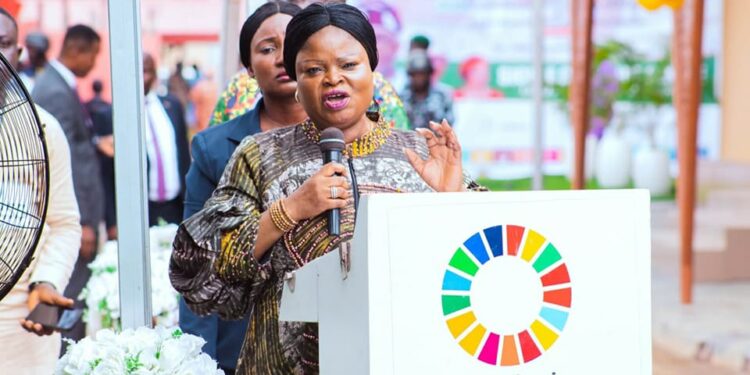With Sickle Cell Disease contributing to approximately 376,000 under-5 deaths annually, compared to 34,400 deaths from other causes, the Office of the Senior Special Assistant to the President on Sustainable Development Goals (OSSAP-SDGs) has taken a significant step to reverse this trend by delivering a fully equipped, state-of-the-art Sickle Cell Care Centre at the Lagos State University Teaching Hospital (LASUTH).
The Centre, commissioned by Lagos State Governor Babajide Sanwo-Olu on Friday, is designed to cater to the needs of the numerous Sickle Cell patients who visit the hospital daily.
Speaking at the event, Governor Sanwo-Olu stated that the centre would provide comprehensive care, including early diagnosis, advanced treatment, and continued management for children suffering from the debilitating condition. He emphasized that the centre will serve as a hub for research and education, fostering greater awareness and understanding of sickle cell disease.
“This will not only transform our total healthcare landscape but will also add to the number of childcare facilities that already exist in our state health institutions. It will raise the capacity of the state’s medical services and, very importantly, contribute to improving the state’s infant and maternal mortality index,” he said.
The governor commended OSSAP-SDGs, noting that the centre would provide an environment where children could receive holistic care tailored to their needs, from medical treatment to psychological support.
“We believe that this will ensure that every child that has an opportunity to come to this facility will come out healthier, better, and be able to fulfill their life,” he added.
The Senior Special Assistant to the President on Sustainable Development Goals, Princess Adejoke Orelope-Adefulire, described the project as part of the efforts to deliver on the Renewed Hope Agenda of President Bola Ahmed Tinubu’s administration. She stated that the centre would enhance the quality of care for children with Sickle Cell Disease, aiming to reduce under-5 mortality and support the attainment of the SDGs in Nigeria. She highlighted the World Health Organization’s declaration of sickle cell disease as a global public health concern and encouraged countries with high disease burdens to establish newborn screening programs for early detection and evidence-based interventions.
Princess Orelope-Adefulire noted, “In August 2023, a Lancet Haematology publication revealed that globally, between 2000 and 2021, the rate of children born with sickle cell disease increased by 13.7 percent, reaching an average of up to 515,000 babies per annum. The study also found that sickle cell-specific under-5 mortality was 11 times higher than deaths due to other causes, amounting to approximately 376,000 deaths from sickle cell disease annually compared to 34,400 deaths from other causes.”
“In Nigeria, approximately one in four, or 25 percent of Nigerians, carries a sickle cell gene, meaning about 50 million people can transmit the gene to their children. We must act now to reverse this trend,” she stated.
Princess Orelope-Adefulire expressed confidence that the Sickle Cell Centre and other related interventions will contribute to achieving SDG-3.2 on “reducing under-five mortality to 25 per 1,000 live births or less by 2030” as well as other cross-cutting SDGs. This aligns with the cardinal pillars on healthcare and empowerment in the Renewed Hope Agenda of the current administration.
Earlier, the Minister of State for Health and Social Welfare, Tunji Alausa, reiterated the Federal Government’s commitment to combating non-communicable diseases and improving healthcare outcomes for Nigerians. He noted that sickle cell disease, alongside malaria, cancer, hypertension, diabetes, and other non-communicable diseases, represents a substantial health burden for the country, worsening morbidity and mortality rates.
“At the federal level, we recognize the urgent need to address these challenges and are committed to building robust infrastructure to manage and mitigate the impact in collaboration with our subnational government. The establishment of this state-of-the-art Sickle Cell Centre is a testament to the dedication of the SDG office to provide quality healthcare and infrastructure to our people. This centre is not merely a building, it is a beacon of hope for many and a cornerstone of our strategy to enhance healthcare services nationwide,” he said.
In the same vein, the Chief Medical Director of LASUTH, Adetokunbo Fabamwo, noted that Nigeria has one of the highest rates of sickle cell disease globally, with up to three million people living with the condition. He emphasized that the condition contributes significantly to childhood morbidity and mortality.
“It is, therefore, apt to have a centre like this to offer preventive and therapeutic care to child sufferers. The establishment of this centre takes a huge chunk of load off the usually crowded therapeutic clinics and wards,” he said.











